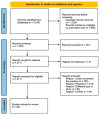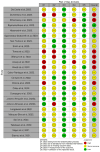Physical Training Protocols for Improving Dyspnea and Fatigue in Long COVID: A Systematic Review with Meta-Analysis
- PMID: 40805931
- PMCID: PMC12346511
- DOI: 10.3390/healthcare13151897
Physical Training Protocols for Improving Dyspnea and Fatigue in Long COVID: A Systematic Review with Meta-Analysis
Abstract
Objective: This study aimed to evaluate physical training protocols for alleviating long COVID symptoms, especially dyspnea and fatigue, through a systematic review with meta-analysis. Method: Data were collected from EMBASE, LILACS, PubMed, Scopus, CINAHL, Web of Science, and grey literature (Google Scholar, medRxiv). Studies evaluating dyspnea and/or fatigue before and after physical rehabilitation, using validated questionnaires, were included. Studies lacking pre- and post-assessments or physical training were excluded. Two reviewers independently extracted data on intervention type, duration, frequency, intensity, and assessment methods for dyspnea and fatigue. Bias risk was evaluated using the Cochrane tool. Results: Combined methods, such as respiratory muscle training with strength and aerobic exercise, were common for long COVID symptoms. Aerobic exercise notably improved dyspnea and/or fatigue. Among 25 studies, four had a low risk of bias. Meta-analysis of two studies found no significant reduction in fatigue. Conclusion: Combined training methods, particularly aerobic exercise, alleviate dyspnea and fatigue in long COVID. More high-quality studies are needed to confirm these findings.
Keywords: exercise; persistent symptoms; post-COVID-19; shortness of breath.
Conflict of interest statement
The authors declare no conflicts of interest.
Figures




Similar articles
-
Chinese herbal medicine for dyspnea and persistent symptoms of long COVID: A systematic review and meta-analysis of randomized controlled trials.J Integr Med. 2025 Mar;23(2):126-137. doi: 10.1016/j.joim.2025.01.001. Epub 2025 Jan 4. J Integr Med. 2025. PMID: 39971694
-
Signs and symptoms to determine if a patient presenting in primary care or hospital outpatient settings has COVID-19.Cochrane Database Syst Rev. 2022 May 20;5(5):CD013665. doi: 10.1002/14651858.CD013665.pub3. Cochrane Database Syst Rev. 2022. PMID: 35593186 Free PMC article.
-
Falls prevention interventions for community-dwelling older adults: systematic review and meta-analysis of benefits, harms, and patient values and preferences.Syst Rev. 2024 Nov 26;13(1):289. doi: 10.1186/s13643-024-02681-3. Syst Rev. 2024. PMID: 39593159 Free PMC article.
-
Exercise interventions on health-related quality of life for people with cancer during active treatment.Cochrane Database Syst Rev. 2012 Aug 15;2012(8):CD008465. doi: 10.1002/14651858.CD008465.pub2. Cochrane Database Syst Rev. 2012. PMID: 22895974 Free PMC article.
-
Physical exercise training interventions for children and young adults during and after treatment for childhood cancer.Cochrane Database Syst Rev. 2016 Mar 31;3(3):CD008796. doi: 10.1002/14651858.CD008796.pub3. Cochrane Database Syst Rev. 2016. PMID: 27030386 Free PMC article.
References
-
- Singh S.J., Baldwin M.M., Daynes E., Evans R.A., Greening N.J., Jenkins R.G., Lone N.I., McAuley H., Mehta P., Newman J., et al. Respiratory sequelae of COVID-19: Pulmonary and extrapulmonary origins, and approaches to clinical care and rehabilitation. Lancet Respir. Med. 2023;11:709–725. doi: 10.1016/S2213-2600(23)00159-5. - DOI - PMC - PubMed
-
- COVID-19 Rapid Guideline: Managing the Long-Term Effects of COVID-19. National Institute for Health and Care Excellence (NICE); London, UK: 2024. - PubMed
-
- Cavigli L., Fusi C., Focardi M., Mandoli G.E., Pastore M.C., Cameli M., Valente S., Zorzi A., Bonifazi M., D’Andrea A., et al. Post-Acute Sequelae of COVID-19: The Potential Role of Exercise Therapy in Treating Patients and Athletes Returning to Play. J. Clin. Med. 2022;12:288. doi: 10.3390/jcm12010288. - DOI - PMC - PubMed
Publication types
LinkOut - more resources
Full Text Sources

